Ni vs. Ne: What Are They and Which Do You Use?
Ne vs. Ni: Which cognitive function do you use? This is one of the questions I get every day as an MBTI® practitioner! Intuition is one of the hardest functions to explain in words; some people describe it as a “sixth sense”. Unlike sensing, which is focused on the concrete and physical world that we can see, hear, smell, and taste, intuition is focused on unseen things; meanings, possibilities, and concepts. It’s a way of being able to know something without being able to explain exactly how you arrived at that point.
Not sure what your personality type is? Take our new personality questionnaire here. Or you can take the official MBTI® here.

Intuitives and sensors are going to have some pretty obvious differences, and to find out more about how to identify one, you can click here. But here’s the thing…
Everyone Uses Intuition
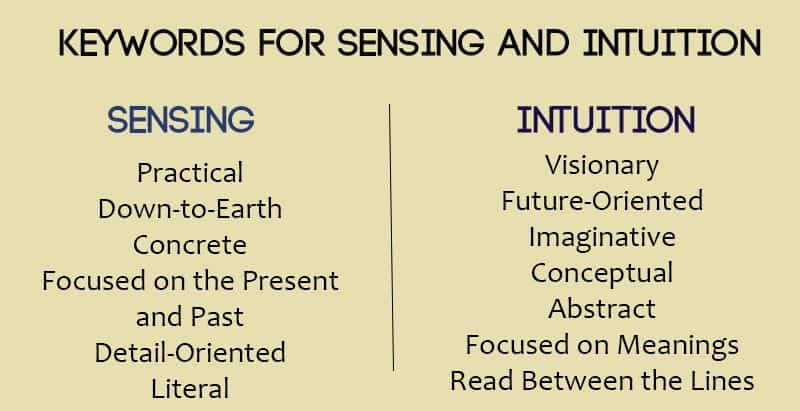
Even the ‘S’ personality types (ISFJ, ESTPs, etc,.) use intuition! Everyone has to use it to get by in life. Every function; thinking, feeling, sensing, intuition, is essential to leading a balanced life. People with a sensing preference just use sensing before they use intuition; so their intuition isn’t as advanced. Sensors will use intuition as their third or fourth preference, and it will be their least-preferred method of perceiving the world around them.
Estimated reading time: 1 minute
What’s the Difference Between Ni vs Ne?
Ne, or Extraverted Intuition, is like a mental butterfly; it flits from idea to idea, making connections between seemingly unrelated things. Yet to the Ne user, it is all related; they find threads of connection between everything. Ne is broad and is inspired by the external world. NPs love exploring possibilities and potential and they are happy when they can talk about the ideas and possibilities they’re thinking about in real time. For instance, someone with dominant Ne might walk into a vintage shop and see a quirky lamp. Instead of just seeing it for what it is, they’ll imagine the lamp in a retro-themed play or as a prop in a photo shoot. They might look for symbolic meaning in the lamp or make up a funny story where the lamp is an integral character. This cognitive function revels in the ‘what could be’ rather than the ‘what is.’
On the flip side, Ni, or Introverted Intuition, is more like a deep-sea diver who plunges into the abyss of the subconscious to retrieve insightful pearls of wisdom. Ni is inspired by the inner world rather than the outer world. It’s an internal process and is easier to tap into when one is in a quiet, unhurried space. Ni is focused on understanding underlying meanings and future implications. Someone with dominant Ni might meet a new person and, rather than focusing on small talk, they’ll likely quickly develop a hunch or prediction about that person’s character or future based on subtle cues. Unlike Ne’s broad and varied radar, Ni is like a laser beam that seeks to pierce through the surface and understand the core essence of things.
Keep reading to find out more about the differences between these two functions!
Personality Types with Extraverted Intuition
Myers-Briggs Types With Dominant Extraverted Intuition:
ENFP and ENTP
Myers-Briggs Types with Auxiliary Extraverted Intuition:
INTP and INFP
The types above are going to be the most skilled at using extraverted intuition (or Ne for short), with ENFPs and ENTPs having the highest mastery of this function.
Myers-Briggs Types with Tertiary Extraverted Intuition:
ESTJ and ESFJ
Myers-Briggs Types with Inferior Extraverted Intuition:
ISTJ and ISFJ
The four types listed above are going to rely on sensing before they access extraverted intuition; however, they will still prefer Extraverted Intuition to Introverted Intuition, which they will hardly use at all.
What is Extraverted Intuition (Ne)?
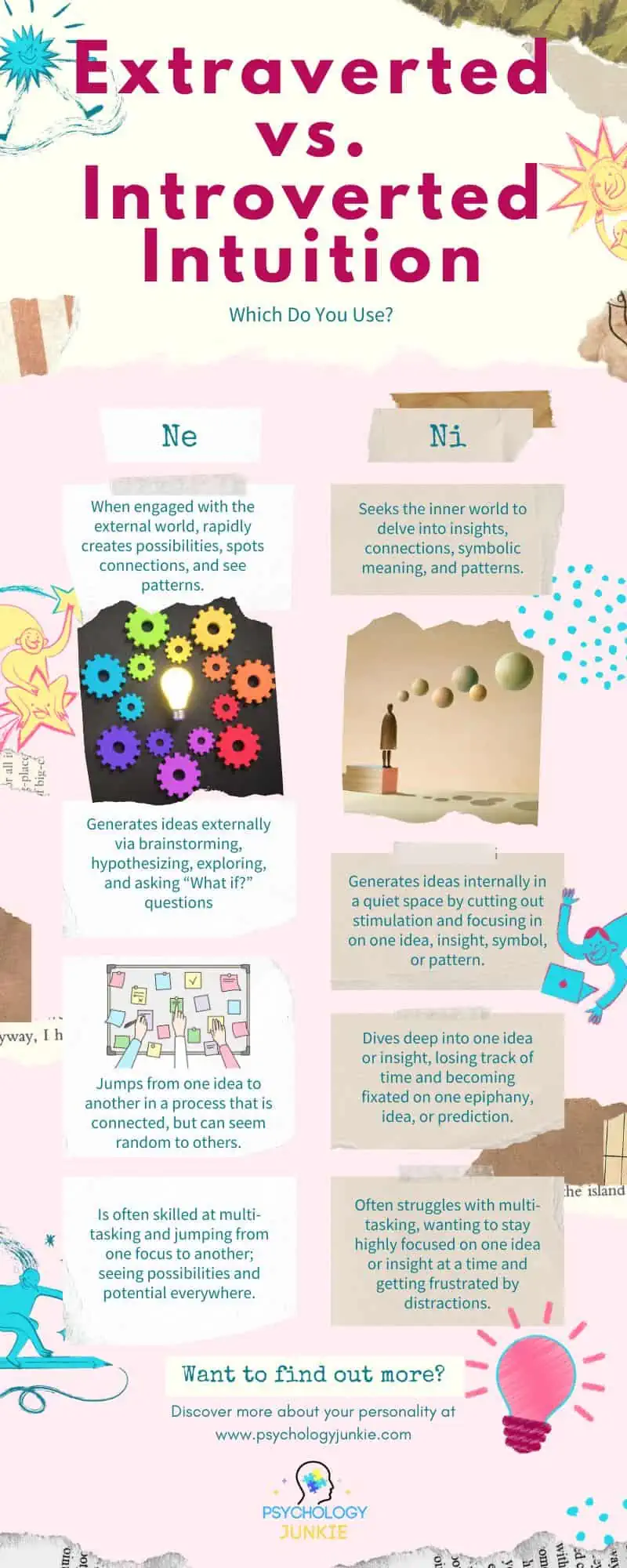
Extraverted intuition (Ne) is the ability to see possibilities, potential, and hidden patterns everywhere. Where Extraverted Sensing (Se) focuses on taking in information through the five senses and acting on it, Extraverted Intuition is about taking in information that is largely theoretical. Concepts, thoughts, ideas are the focus of Extraverted Intuitives. This is why, usually, extraverted sensors are skilled at spotting details, working with their hands, or grasping anything that involves the physical world. They are also good at seeing in-the-moment opportunities and getting involved in them. Extraverted intuitive types are skilled at coming up with ideas, concepts, and possibilities. They look at their surroundings and see numerous connections and possibilities that they want to explore. Ne-users are the Dr. Seusse’s, the Oscar Wilde’s, and the Walt Disney’s of the world.
Ne-users (NP personality types) are always looking to the future to see what could be. They love the world of limitless possibilities and keep their minds open to constant growth and improvement. They tend to be very creative people, which is why the world of artists, musicians, and writers is full of Ne users. They desire new and novel experiences and often become restless if left in a routine, unchanging place in life.
Ne users are often groundbreaking entrepreneurs and visionaries; they have a desire to make things happen and make their mark on the world. They get a rush of excitement when they’re able to pursue their dreams and plans, and their naturally charismatic personalities make it easy for them to find others to join them.
Another trait of Ne users is their ability to make obscure connections between seemingly unrelated things. The Ne user can see two very different topics and bring them together in a way that can be surprising to many, and often gives the Ne user an off-beat sense of humor.
Ne users are slow to finalize decisions and form judgments; they like to keep their options open and their minds open so that they can constantly be evolving their thought processes. For this reason, they are often very open-minded, accepting people who aren’t quick to impose their judgments on other people.
The minds of Ne users often move at a frenetic pace. They often seem restless, absorbed in thoughts, and enthusiastic about sharing those thoughts. They want life to be exciting and full of fun and discovery; and oftentimes find sleep to be a boring waste of time. For this reason, they can have erratic sleep patterns or suffer from insomnia. They want to constantly be taking in new information and don’t like to shut off their minds. Trying to sleep with a Ne user can be frustrating for a sensor because the intuitive will constantly be bringing up new ideas when the sensor is more likely to be winding down for sleep.
People with auxiliary extraverted intuition (INTPs and INFPs) will probably relate to most of the things above, but their experience may not be as extreme. They will channel the intuition first through either Introverted thinking (Ti) or Introverted Feeling (Fi). This can make them seem a little quieter or focused than ENFPs or ENTPs, who use Ne as their dominant function.
Personality Types with Introverted Intuition (Ni)
MBTI Types with Dominant Introverted Intuition:
INFJs and INTJs
MBTI Types with Auxiliary Introverted Intuition:
ENTJs and ENFJs
The types above will be the most skilled Ni (introverted intuition) users; with INFJs and INTJs having the highest mastery of this function.
MBTI Types with Tertiary Introverted Intuition:
ISTPs and ISFPs
MBTI Types with Inferior Introverted Intuition:
ESTPs and ESFPs
The four types above are going to prefer sensing before intuition, but will still try to use it from time to time.
Understanding Introverted Intuition
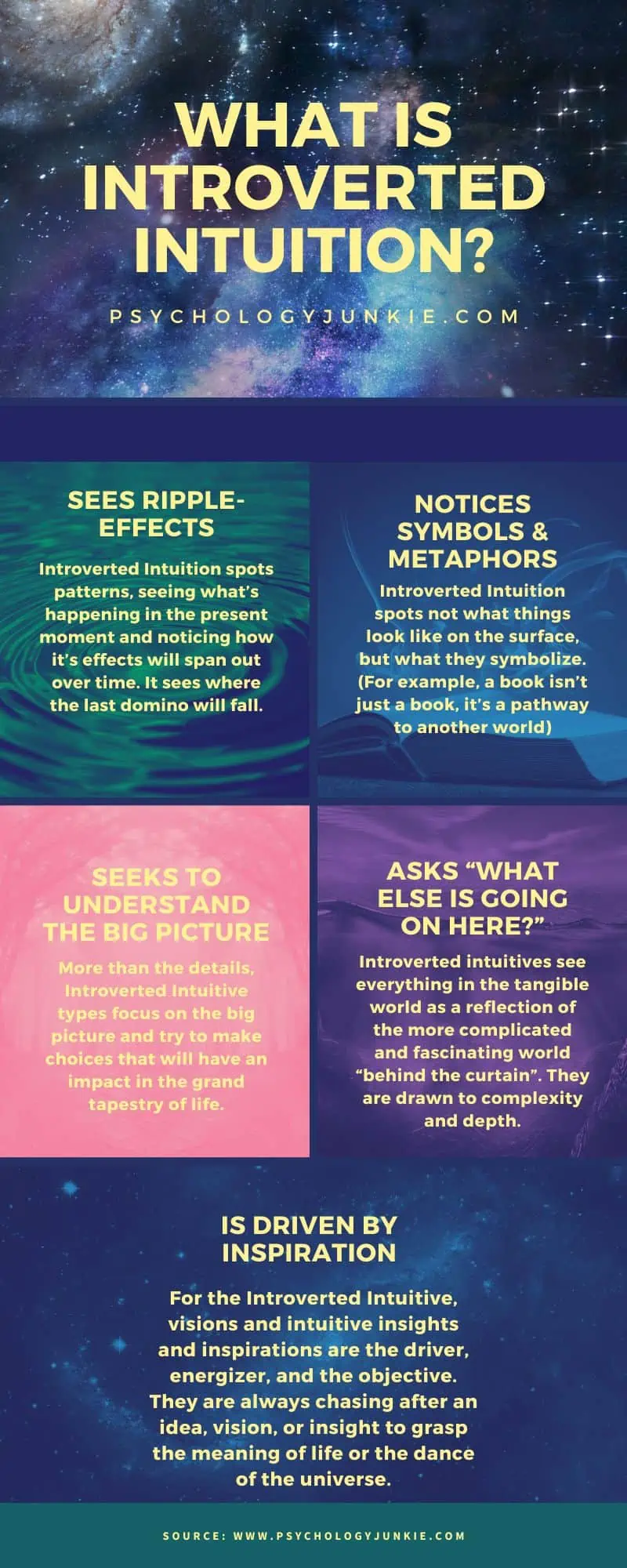
Introverted intuition is similar to extraverted intuition; except that it is more of an internal process, and it is more inspired by the unknown and unconscious. Ne users generate unlimited possibilities that they put into the outside world, leaping from one idea to the next. Ni users are much more internally focused, diving deep into one concept or idea that is teasing their mind. They keep more of their insights to themselves until they are fully fleshed out. They may let their minds wander from idea to idea, but they usually won’t share their ideas until they’ve come to a sense of “knowing” or “divining” that ideas purpose. They crave a sense of certainty about how viable their idea is. Introverted intuitives are more focused on predicting than generating possibilities.
Where the Ne-user enjoys brainstorming numerous ideas, jumping from one to the other, the Ni-user is more likely to focus in-depth on one and feel flustered if they have to jump around from one to another rapidly.
Ni-users love the world of ideas and visions, and often think in images, symbols, and metaphors. They notice patterns easily, and are excellent strategists, often coming up with a “master plan” or forecast of the future. They are the Nikola Tesla’s, Stephen Hawking’s (INTJs), Leo Tolstoy’s, and the C.S. Lewis’s (INFJs).
Ni users are more concerned with the big picture than any other type. They are the most abstract and forward-looking of any of the types, and they have very little patience for the here and now. For this reason, they are very frustrated when having to deal with monotonous, day-to-day tasks and may have to work harder at being fully present.
Ni users (NJ personality types) often have strong gut feelings that are hard to explain verbally. Their visions or predictions often appear out of the blue and they may have a hard time pinning down how they have come to their conclusions. It usually takes time and solitude thought for them to discern how one thing led to another.
Ni users need to zone out of the world around them o n a regular basis. They are highly sensitive to the external sensory world and are easily over-stimulated. They like to delve deep into the recesses of their mind and analyze all the information they’ve picked up in order to create a trail or pathway that leads to one main idea or insight. They are very reflective and need a lot of quiet and alone time to process their thoughts.
The thinking Ni types will come across as very blunt and sarcastic. They like narrowing down their options and finding the most logical path forward. The feeling Ni types have a more accommodating communication style; still often sarcastic, but often at their own expense. They will feel other people’s emotions and be much more heavily affected by them. They also enjoy narrowing down their options and finding a strategy that will accommodate people.
Strengths and Weaknesses of Ni vs Ne:
Ne Users – Strengths:
– Open-minded
– Curious
– Creative
– Energetic and enthusiastic
– Good at communicating
– Charismatic
– Excellent brainstormers
– Original
– Flexible
– Visionary
– Charming
Ne Users – Weaknesses:
– Unfocused
– Can struggle with practical skills
– Can overthink and obsess over things
– Sometimes independent to a fault
– Prone to procrastination
– Turbulent emotionally (more with the feeling types)
– Can look down on other, more practical types and see them as “narrow-minded”
– Can struggle with following through or completing projects.
Ni Users – Strengths:
– Creative
– Insightful
– Inspiring
– Passionate and determined
– Strategic
– Imaginative
– Independent
– Dedicated
– Original
– Conceptual
Ni Users – Weaknesses:
– Overly analytical
– Perfectionistic
– Loathe structure
– Highly sensitive (more common with feeling types)
– Overly sarcastic
– Can be overly-judgmental
– Extremely private
– Easily burn out
– Prone to over-indulgence when stressed
– Gets lost in foreseeing, ignoring the needs of the “here and now”
What Are Your Thoughts?
Did you enjoy this article? Do you have any thoughts or experiences to share? Let us know in the comments!
Find out more about your personality type in our eBooks, Discovering You: Unlocking the Power of Personality Type, The INFJ – Understanding the Mystic, The INFP – Understanding the Dreamer, and The INTJ – Understanding the Strategist. You can also connect with me via Facebook, Instagram, or Twitter!

What are your thoughts?
Do you use extraverted or introverted intuition? Can you relate? Do you have any questions? Let me know in the comments! I’d love to hear from you.
Other Articles You Might Enjoy:
10 Signs That You Might Be an Extraverted Intuitive
10 Signs That You Might Be an Introverted Intuitive
A Beginner’s Guide to Identifying Someone’s Myers-Briggs® Personality Type
Subscribe to Our Newsletter

Want to discover more about personality type? Get the inside scoop with Susan Storm on all things typological, along with special subscriber freebies, and discounts on new eBooks and courses! Join our newsletter today!


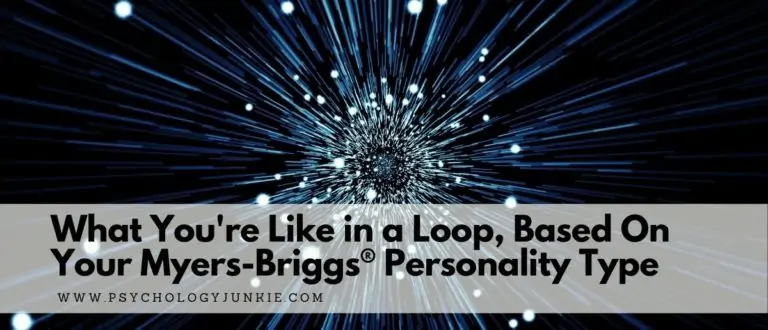
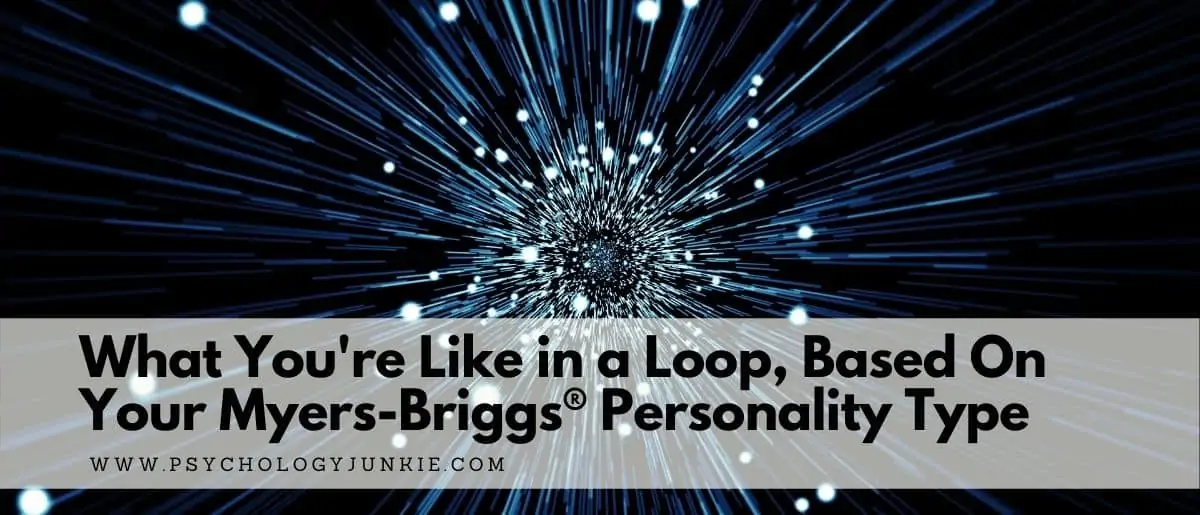
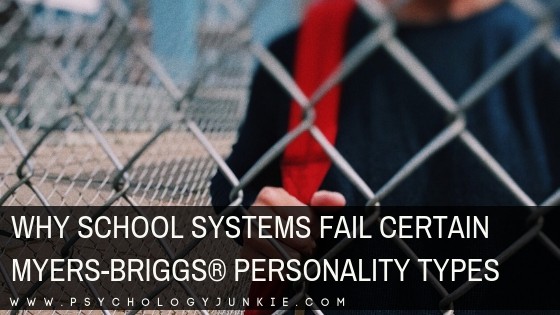







I use introverted intuition – your description above matches me perfectly (except I don’t think I hate structure)! Currently stressed and over-indulging :p
I’m sorry to hear you’re stressed! I hope you’re indulging on chocolate:) So which type are you? INTJ, INFJ, ENTJ or ENFJ? Thanks for the comment!
Yes, lots of chocolate! I’m an INFJ 🙂
As INTJ I appreciated the thorough and comprehensive coverage. I wish there was more on the best match ups for types. I find that locating an INTJ woman is next to impossible.
Do you mean you wish that there was more information on which types are most compatible? I’ve done some research on that and would definitely be interested in writing a blog on that (or probably several, it’s a big topic!). As an INTJ, which types do you personally feel you connect with most easily?
I haven’t looked much into it. You seemed to be insightful. I would love to see one or more posts regarding comparability. I can’t rightly say that I’ve found myself attracted to a particular personality. So I’m in the beta testing phase for those ideas.
I need to be able to exercise my overly cerebral tendencies. I struggle hugely when I’m trying to let feelings flow. I can’t easily deal with others who seem to be very basic, and not able to use their mind Consequently they seem too simple minded. They seem to me, as people who can’t be bothered to grow.
My best friend is an intj woman and has had terrible luck in relationships.. She is a loving and caring girl and men just can’t seem to relate to her at all.
I am a predominantly Ne user (INTP), but “…need to “zone out” of the world around them quite frequently; … highly sensitive to the external sensory world, and are easily over-stimulated. … like to delve deep into the recesses of their mind and analyze all the information they’ve picked up and create a trail or pathway that leads to one main idea or insight. They are very reflective, and need a lot of quiet and alone time to process their thoughts.” resonates deeply with me. I often get fierce headaches due to an extremely stimulating environment, and I could spend any length of time pondering all the lovely dreams I’ve had a long time back and still remember, and trying to spin stories off them.
Again, nice article.
I think that Ne and Ni have a lot of similarities, and I found when researching and writing this article that I related to a ton of Ne attributes. I believe I’m an INFJ, but always leave myself open and research other options in case I am wrong. I’ve wondered sometimes if I’m an INFP because I see a lot of similarities, but at the same time certain things just don’t add up at all. I think one of the main differences between Ne and Ni is that Ni is more obsessed with one main idea, whereas Ne is interested in numerous ideas and possibilities. All the Ni users I know seem to have one main obsession that they immerse themselves in, whereas the Ne users are a little more easy-going about it and can find many theories and concepts and possibilities that they’re interested in. Does this seem to match up to you? I’m very curious what you think!
Yes, it does! I’m horrid at multitasking regarding physical objects and daily chores (bad Se), but I can easily imagine of two, three, four different scenes, immediately jump over to some book I’ve been reading, something I needed to get done, without losing track of my previous idea. A friend of mine, apparently an Ni user, gets exasperated with this. Speaking of obsession with one idea, she does that really well.
I jump around alot when not at peace within myself, whether in the presence of others or not. I find distractions very unsettling. When I am at peace and alone, I think well , stay focused, and accomplish a lot. I start out thinking like Ne, but then, after considering many roads and thoughts, I switch to Ni. Ne thinking is very wearing, but find it necessary to educate myself. My ultimate goal is to make a decision / conclusion, however, so I do my research, but then bring thoughts to a close and decide.
My brother is an ENTP and you described his Ne perfectly! Once again, I’m amazed by the way that you so clearly articulate such complicated functions. Keep up the fabulous writing. 🙂
Thank you!! I appreciate the encouragement!
Nailed it! I am a INTJ and the Ni describes my tendencies very well. Great writing Susie!
Thanks Dan! I appreciate it! INTJs are really ingenious people and I always enjoy talking to them and hearing their insights about life.
Your description helped me so much. I took the test many times because I kept getting different outcomes. The first time, I was a INFJ, but I always wondered if I was a sensor instead because I’m not really attracted to theories and I am aware of my surroundings always. But your description got me spot on! I am “highly sensitive to the external sensory world” and I think this is what got me confused.
I love the explanations given in this site. I believe that I have Ni but I’m just never really sure. Thanks for this Susan. 🙂
Thank you for reading! I am so glad if it is helpful 🙂
i’d say the Ne points are pretty much spot on for me.Erratic sleep,creative,poor follow-through skills are some that stood out to me.
Strengths and weaknesses are spot on for me. I guess that’s why I hate housework so much- same boring thing over and over. Hard to be creative washing dishes, so I procrastinate. Love reading your stuff! Helps to know I’m not the only one!
I completely understand – I hate housework too for the same reason! I’m so glad you enjoy my articles, thank you 🙂
No doubts that I have Ni, still overwhelmed by the amount of things that coincide with my way of being
Hi Mike! Are you an INFJ or INTJ? Glad to have you here!
I am an INTP. I can relate almost everything above on Ne, yet I have problems interacting with people, I want to develop my Ne part.
So ENxP’s are less creative and less insightful than INxP?
*INxJ
Why is Ni more creative than Ne?
It’s not, I just spent a long time looking through the post to see what gave that impression and realized I said “creative” on Ne and “highly creative” on Ni. An unintentional mistake which I’ll fix asap. Thanks for noticing it so I can fix it 🙂
How is it that I can so easily relate to both of these? For a while I’ve thought to be an ENTP. Reading this, however, I feel like I lean only slightly to Ne than to Ni. Everything about Ni still described me disturbingly well, minus being “extremely” private.
same here bro
Can I be both? It seems like i have this super intuitor type of thing going on here. I can relate to all of these qualities and I happen to be an ambivert. Thanks for reading.
WOw,now I understand why when I (ENFP) throw out one option after another after another to my INFP son, he gets flustered and only wants to hear two or three choices and stick with the one he chooses without hearing any more. Thanks for the insight!!
Actually INFPs have extraverted intuition too…
Absolutely. It says it in the article. There’s a section that shows all the types who use it.
This is so me (INTJ) and my stepson (ENFP) – and our conversations often really frustrate my ISTJ husband!
I don’t usually comment on things but I loveddd this article. Actually I love all your articles, I’m just freakishly private. I’m an INFJ I think- I’m not very good at being certain of myself haha. But I loved your points about the strengths and weaknesses of Ni. Just YESSS to all of that. Thank you so much for all your detailed and brilliant work!!
(And for sharing about how you used Se in an unhealthy way; I’m so sorry you went through that but thank you for sharing: this is unrelated FYI)
I want you to know I enjoy all your articles. Thank you so much for your emails and keeping this website going. It has given me and my family much to talk about. Being an ENFP I see the correlation between their behavior and their personalities. I wish they would. Lol
Thank you Brad! I’m really glad you’ve been enjoying the articles 🙂 I hope your family will be more receptive to typology soon!
I don’t feel like loathe structure is a fair assessment of an Ni user. I enjoy outer structure in my environment so I don’t have to deal with it as much and can focus on more interesting things, that is to say the unstructured exploration that’s going on inside my head 🙂
You have given me such great insight and understanding of my INFJ personality. For so many years I thought the way I felt and thought was a curse. But you have helped me see that the facets to my personality are purposeful. Thank you.
I’m so glad Jan! Thank you so much for letting me know! This makes my day 🙂
I can relate to much of both. Where they seemingly contradict, I’m kind of in the middle.
I feel like predominant Ni users don’t particularly “loathe” structure in the sense that most of the abstract thinking made through this function is usually based around the idea of a movement of ebb and flow between different layers of information. In other words, multiple sub-structures clashing with their counterparts in an attempt to refine themselves and produce the ideal one. Everything is but an endless collapsing and renewing in their mind; all to really say that structure there is, but malleable by nature shall they also be.
I think Ne users feels joy connecting among many things while Ni users feel joy connecting everything as one.
Anyway, i may be an INFJ although sometimes I feel like an INFP.
I wonder you if the author of this content is still available as many years have passed. I would like to hear more of the author’s seasoned thoughts.
I appreciate your article.